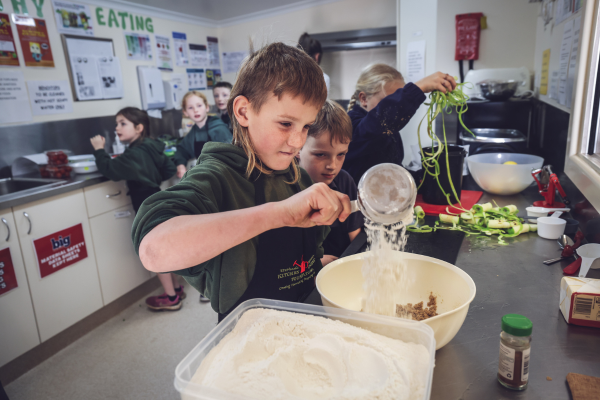Food, gardening and school engagement

A news story in The Age recently reported that Victorian public secondary students are skipping more school than ever recorded, sending absenteeism well above pre-COVID levels. Absenteeism in Victoria was more pronounced in regional areas in 2023, and virtual enrolments are surging across the state.
CEO of the Stephanie Alexander Kitchen Garden Foundation, Dr Cathy Wilkinson, shared with The Age a survey we ran with parents and carers of children reluctant to attend school. The survey found 77 per cent of parents reported increased enthusiasm to attend school on cooking and gardening days. “For people trying to support a student to attend school … that is pretty significant,” Cathy said. “For children that might not perform in the traditional classroom, or are considered at risk of long-term disengagement, our Kitchen Garden Program is where some of the most significant outcomes are seen because it creates a different environment for them to shine.”
Building self-esteem and confidence
A University of Melbourne evaluation found that not only did participation in the Kitchen Garden Program lead to more positive attitudes towards school, it also led to an increase in children’s self-esteem, with some of the most significant outcomes seen in children at the lower end of the academic achievement scale or those considered at risk of long term disengagement from education.
A previously discouraged student demonstrated how the experience of the Kitchen Garden Program led to feelings of enthusiasm about attending school and a new growth mindset, saying that the program made him feel, “I’m really good at this and I can do other things as well.” Beyond the kitchen and garden sessions, this newfound confidence was observed both at home and in the classroom, positively impacting children’s lives more broadly.

Social connection soars
An important predictor of mental health is social connectedness. The same University of Melbourne evaluation found strong evidence of positive social outcomes for children, schools and communities involved in the Kitchen Garden Program.
Why? Working in the kitchen and garden in groups creates opportunities for children to work with others beyond their usual friendship groups. This teaches children a valuable skill in teamwork and offers a means for widening social networks.
As noted in the evaluation, teachers described some cases of changed social dynamics among the children. For example, one child who was normally socially excluded, achieved “hero status” in the kitchen classes because she could chop the onions without crying. Without the competitive structure of academic or sporting activities, the Kitchen Garden Program creates a level playing field allowing all children the opportunity to experience success.
Wellbeing rises in the kitchen garden
A report from the NSW Department of Education states, “Students who experience a positive sense of belonging at school have improved overall wellbeing, mental health and long-term academic success. They are more likely to experience positive relationships, tend to value learning, and show high levels of school engagement.”
The holistic approach of the Kitchen Garden Program delivers significant wellbeing benefits to children and young people. The program has been recognised on the Wellbeing panels of state education departments, by Beyond Blue’s Be You program, and on ARACY's Wellbeing in Education panel for its demonstrated impact in all six domains of Nest: Australia’s wellbeing framework for children and young people. The program is also aligned with the World Health Organization's Health Promoting Schools, the National Children's Mental Health and Wellbeing Strategy, and the National Preventive Health Strategy.
Looping in the community
Social cohesion and community pride are enhanced through an inclusive and immersive Kitchen Garden Program which links in family and community. We hear many stories from our member schools and early childhood services, where opportunities have been created to build cultural and social understanding through shared cooking and gardening knowledge.
At one culturally diverse school, several teachers, as well as the principal, noted that the Kitchen Garden Program was providing a way for parents from a non-English speaking background to be more involved in their children’s education. At this school, several parents volunteered in the kitchen who would have been uncomfortable doing so in the classroom because of their lack of English language proficiency.
Keen to dig in?
Time and again, research and evaluation demonstrates that the Kitchen Garden Program improves food literacy and behaviour, increases fruit and vegetable consumption, strengthens student wellbeing, social skills, school engagement and sense of belonging, connects children to nature, and builds broader community resilience. Evidence shows particular benefits for diverse socio-cultural communities and children at high risk of disengagement.
To explore how the program can benefit your school or early childhood service, please reach out to our Support Team on 13000 SAKGF (1300 072 543) or support@kitchengardenfoundation.org.au
< Back to Latest News
